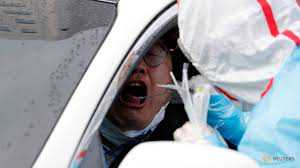Enough COVID-19 test kits for Myanmar, says WHO representative
25 March, 2020

Myanmar - which announced two COVID-19 positive conditions on Monday (Mar 23) - currently has enough check kits to find suspected instances, says a World Health Organization’s (Who have) official.
This assurance originated from WHO representative to Myanmar Stephan Paul Jost, as news of both positive cases sparked panic buying in Myanmar.
Up until late-February, Myanmar had to send samples of suspected instances to Thailand for screening.
But since Feb 20, Myanmar's National Health Laboratory has been equipped with COVID-19 test products, donated by countries including Thailand, Japan, US, Singapore and China.
Each test kit is one-time use, but a suspected patient should be tested at least 3 x for accuracy, Dr Jost said.
"For the present time, Myanmar has some 5,000 or more test kits, which can test some 1,700 people," he said.
"Myanmar won't run out of check kits any time in the future - and there is no have to panic," explained Dr Jost, adding plans happen to be under method for Myanmar to obtain more test kits, including possibly from South Korea, which he explained has extra capacity to make donations to Myanmar.
To time, Myanmar has tested in least 215 people since the start of outbreak - training to an average of two people a day.
A good public healthcare official, who spoke on anonymity, told CNA the test standards for COVID-19 are high, which is why so far, only around 200 persons are tested in a country which has a population of 54 million, along with foreigners entering the united states.
The general public healthcare official said: "Myanmar's infectious diseases model isn't planned to handle a crisis that potentially has a sizable number of casualties, or would tax heavily on the country's healthcare resources."
Dr Jost admitted Myanmar's healthcare system possesses its shortcomings, which is why the authorities have been putting safeguards set up since the outbreak were only available in China.
"Myanmar knows it cannot put its public healthcare system in the back chair and it didn't allow that to happen," he said.
The efforts include Myanmar forming a higher level committee to handle the virus as soon as January.
Myanmar also turned a good plane back to Guangzhou in late-January, after a single passenger presented flu-want symptoms.
In early on March, Myanmar banned a cruise liner from docking in Yangon, citing worries the vessel had passed through locations with cases of COVID-19.
On Monday, Myanmar announced it had two imported cases of the virus - one, a 36-year-old man who had a travelling history to the united states, and another, a 26-year-old gentleman who had a travelling history to UK.
According to state mass media, the 26-year-old man found its way to Yangon upon Sunday - a day following Myanmar rolled out travel restrictions, including subjecting tourists who had been to the UK within the last 14 days to come to be quarantined for 14 days.
Despite not presenting COVID-19 symptoms, the 26-year-old guy was tested great for the virus on Monday.
The other traveller is a 36-year-old man who entered Myanmar on Mar 13 - days before Myanmar tightened travel restrictions. He was tested only after he observed a health care provider when he emerged down with fever on Mar 19.
But by enough time he was first diagnosed in Sunday, the person had left a 10-evening trail within Myanmar as he previously travelled to Chin Condition in the country's northwest.
The two men are actually in isolation and reported to be in good health. The authorities are contacting those whom both men had been in touch with.
Dr Jost said Myanmar's leading priorities now are to "continue steadily to expand testing, continue steadily to contact-trace, continue steadily to isolate the virus and break the chain of transmitting".
Observers have raised concern over the lack of cases found in Myanmar before Monday's recognition.
Human Privileges Watch’s Asia division deputy director Phil Robertson had last week branded Myanmar government's frame of mind due to "irresponsible", saying it served only to give people a false sense of security.
But Dr Jost stressed Myanmar is going all out to put aggressive healthcare measures set up, beefing up ability to test, detect, contact-trace and isolate situations.
"Now's the time for cool-headed and rational decision-making and support," Dr Jost said.
Source:
TAG(s):
